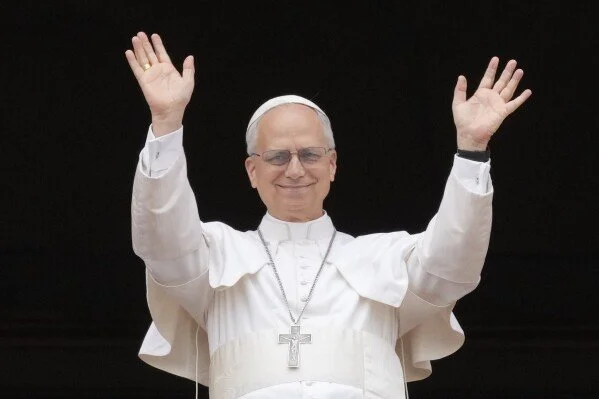Where is Sin? An Early Look at the Papacy of Leo XIV
The passing of a pope and the election of a new one is big news. With the election of a new pope the Catholic Church, which represents over one billion people worldwide, is choosing a new leader that will serve in that role (most likely) until his death. The election of Pope Leo XIV on May 8th has been “the talk of the town”, from office chatter to major news outlets. Everyone is curious about Robert Francis Prevost, the first ever American pope. Who is this man? What kind of pope will he be?
Evangelicals asking this question should exercise theological responsibility in considering the office of the papacy and the person who is now Pope Leo XIV. A simple way of doing that is by keeping sin primary. Essential to the gospel message is a biblical understanding of sin. If there is no sin, there can be no gospel. The good news of Jesus Christ makes no sense apart from the reality of sin. Furthermore, the glory of the gospel corresponds to the devastation of sin. If sin is spiritually devastating, creating spiritual death, then the gospel is glorious, providing new life where previously there was death. If sin is small, the gospel and the cross of Christ are also small. This is what is meant by keeping sin primary as evangelicals consider not only their own life and their own church, but when also considering the Bishop of Rome, who is now Pope Leo XIV.
What does the new pope have to say about sin? While it is certainly early and much is still to be learned and discovered about Robert Francis Prevost, there are some early indications that perhaps shed light on his theological convictions and what role sin plays in them. Yesterday he gave his first address to the College of Cardinals. Two items are worthy of mention. Firstly, he explained why he chose the name Pope Leo XIV. Here is the reason he provided:
“I chose to take the name Leo XIV. There are different reasons for this, but mainly because Pope Leo XIII in his historic Encyclical Rerum Novarum addressed the social question in the context of the first great industrial revolution. In our own day, the Church offers to everyone the treasury of her social teaching in response to another industrial revolution and to developments in the field of artificial intelligence that pose new challenges for the defence of human dignity, justice and labour.”
Written during the industrial revolution in 1891, Rerum Novarum addresses the rise of modern capitalism, socialism, and the struggles of the working class. It is considered a foundational text for the Catholic Church’s teaching on social issues. In it, however, sin is barely present. Society’s ills are accredited to sin (RN, n. 18), but there is no gospel response to it. The cure for social injustice is instead the following:
“Let the working man be urged and led to the worship of God, to the earnest practice of religion, and, among other things, to the keeping holy of Sundays and holy days. Let him learn to reverence and love holy Church, the common Mother of us all; and hence to obey the precepts of the Church, and to frequent the sacraments, since they are the means ordained by God for obtaining forgiveness of sin and for leading a holy life” (RN, n. 57).
Obey the Church and frequent the sacraments. This is the key to the forgiveness of sin and for leading a holy life. An evangelical reading must note that key elements are absent here. Christ is absent, the cross is absent, and repentance is absent. Without these there can be no true gospel. Without these we are left with a low view of sin and a high view of man, both of which are enemies of the biblical gospel. Rerum Novarum, however, has clearly been influential to Pope Leo XIV.
Secondly, in his address to the College of Cardinals Pope Leo also mentions Pope Francis’s lengthy and popular 2013 Apostolic Exhortation Evangelii Gaudium. In his address Leo XIV highlights the following points of EV that are for him fundamental: “the return to the primacy of Christ in proclamation (cf. No. 11); the missionary conversion of the entire Christian community (cf. No. 9); growth in collegiality and synodality (cf. No. 33); attention to the sensus fidei (cf. Nos. 119-120), especially in its most authentic and inclusive forms, such as popular piety (cf. No. 123); loving care for the least and the rejected (cf. No. 53); courageous and trusting dialogue with the contemporary world in its various components and realities.”
In each of these “fundamental” aspects of EV, including a return “to the primacy of Christ in proclamation”, sin is nowhere to be found. And it is worth noting that Pope Leo refers to these as “evangelical principles.” God’s love is present, but there is no sin. God’s love, however, loses its salvific and redemptive value if sin is absent. No sin, no gospel. That is why sin must maintain a primary place in the gospel narrative. In all that Leo XIV has mentioned and referenced in his short papacy, sin is absent. Time will tell if that changes or not.
However, going back to an interview with the Catholic News Agency in 2012 regarding the Synod of Bishops on the New Evangelization, Prevost was asked a series of questions about evangelization in light of the challenges created by media. While he speaks of a personal relationship with Christ, sin is never mentioned in the entire interview on evangelization. Pope Leo is an Augustinian and therefore mentions Augustine in this interview. On the balcony of St. Peter's, upon being introduced to the world as the new pope, he said “I am a son of Saint Augustine, an Augustinian.” Augustine, however, promoted a biblical view of sin and understood its devastating effects on fallen humanity. Pope Leo, however, makes no mention of sin. An evangelical must ask what it means to have a personal relationship with Christ apart from the presence of sin.
Time will reveal Pope Leo’s doctrinal convictions concerning sin and its effects on fallen human nature. In the meantime, the evangelical church must keep sin primary so that it does not fall victim to being led astray by gospel words and terminology that lead one to believe that the biblical gospel is being referenced when the Catholic Church and its Bishop speak of sharing the gospel. No sin, no gospel. It is yet another case of same words, different worlds.

